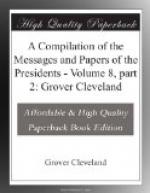The unadjusted difference, however, between the two Governments as to the interpretation of the first article of the convention of 1818 is still a matter of importance. American fishing vessels, within nine or ten years, have been excluded from waters to which they had free access for twenty-five years after the negotiation of the treaty. In 1845 this exclusion was relaxed so far as concerns the Bay of Fundy, but the just and liberal intention of the home Government, in compliance with what we think the true construction of the convention, to open all the other outer bays to our fishermen was abandoned in consequence of the opposition of the colonies. Notwithstanding this, the United States have, since the Bay of Fundy was reopened to our fishermen in 1845, pursued the most liberal course toward the colonial fishing interests. By the revenue law of 1846 the duties on colonial fish entering our ports were very greatly reduced, and by the warehousing act it is allowed to be entered in bond without payment of duty. In this way colonial fish has acquired the monopoly of the export trade in our market and is entering to some extent into the home consumption. These facts were among those which increased the sensibility of our fishing interest at the movement in question.
These circumstances and the incidents above alluded to have led me to think the moment favorable for a reconsideration of the entire subject of the fisheries on the coasts of the British Provinces, with a view to place them upon a more liberal footing of reciprocal privilege. A willingness to meet us in some arrangement of this kind is understood to exist on the part of Great Britain, with a desire on her part to include in one comprehensive settlement as well this subject as the commercial intercourse between the United States and the British Provinces. I have thought that, whatever arrangements may be made on these two subjects, it is expedient that they should be embraced in separate conventions. The illness and death of the late Secretary of State prevented the commencement of the contemplated negotiation. Pains have been taken to collect the information required for the details of such an arrangement. The subject is attended with considerable difficulty. If it is found practicable to come to an agreement mutually acceptable to the two parties, conventions may be concluded in the course of the present winter. The control of Congress over all the provisions of such an arrangement affecting the revenue will of course be reserved.
The affairs of Cuba formed a prominent topic in my last annual message. They remain in an uneasy condition, and a feeling of alarm and irritation on the part of the Cuban authorities appears to exist. This feeling has interfered with the regular commercial intercourse between the United States and the island and led to some acts of which we have a right to complain. But the Captain-General of Cuba is clothed with no




